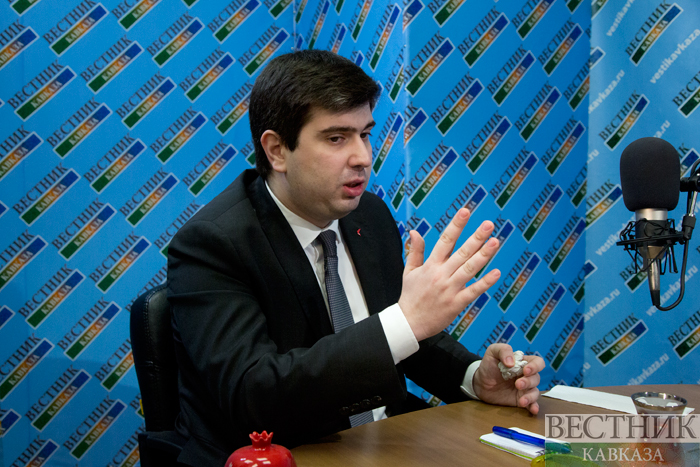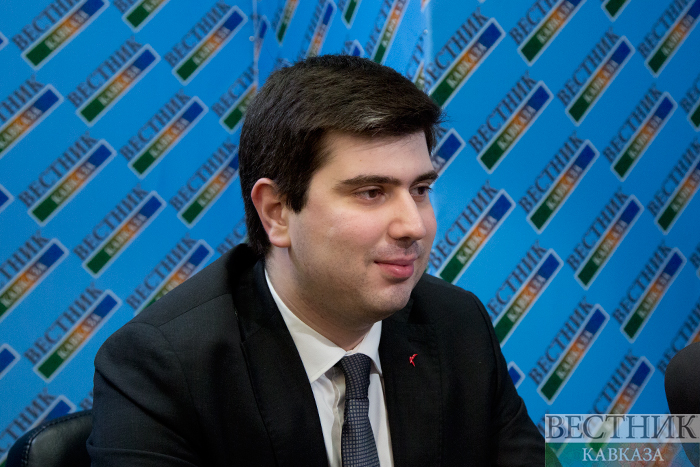Expert of the Valdai International Discussion Club, political analyst and Iranist Farhad Ibragimov spoke about relations between Azerbaijan and Iran.
- If we consider Russian-Iranian relations through the prism of the South Caucasus, then what is the situation today?
- In relation to each of the Transcaucasian republics, Iran has its own strategy. So, Iran-Azerbaijan relations over the past five to six have reached a qualitatively new level. This is not the data of diplomats, experts, political scientists who approach this issue complementary, but an indisputable fact. In the 1990-2000s, relations between Iran and Azerbaijan were cool - Tehran was interested in promoting the export of the Islamic Revolution in Azerbaijan. Now in Iran, of course, they deny it, but it’s true. After the 1979 Islamic Revolution, the ayatollahs who came to power in Iran (as they are called the “black mullah regime”) decided to promote their ideas in countries dominated by the Shiite Muslim population: in Bahrain, Iraq, and Lebanon.
Obviously, with regard to Azerbaijan under the USSR, such an idea could only be admitted theoretically, since the Soviet Union at that time was strong enough, although it was already weakened by the invasion of Afghanistan. After the collapse of the USSR, since 1992, some Iranian politicians began to develop a formula that would return to these ideas of exporting the Islamic Revolution to Azerbaijan. They wanted to create a Shiite axis, which could become a kind of seat belt for Iran. Moreover, the Iranians themselves experienced great problems at that time: the Iran-Iraq war ended in a draw, but caused great damage to the economy and the prestige of Iran on the world stage. After the revolution, the officer corps that existed under the Shah was completely destroyed. From a military point of view, the Iranians filled their hands, gained some experience, but Tehran was sorely lacking in resources. In this regard, the Iranians hoped that if a certain Shiite axis was created on a geopolitical scale, then it could bring Iran to a new level. However, Azerbaijan immediately made it clear that there could be no talk of an Islamic republic. We, as they said in Azerbaijan, love Islam, respect, accept, but it should not be in politics, since the way of life of Azerbaijanis does not mean the full integration of religion into politics.

- The domestic political situation in Azerbaijan at that time did not give Iran hope for exporting its ideas?
- Relations between Tehran and Baku have deteriorated under the "Popular Front" in Azerbaijan. The "Front" ruled only a year, but broke firewood so that relations were spoiled not only with Iran, but also with China, and Turkey, and with Russia. As a result, the Popular Front sank into oblivion, but relations between Tehran and Baku did not improve overnight, since there was no important element of trust. Then the Armenian-Azerbaijani Nagorno-Karabakh conflict was flashing with might and main, and Iran did not join the blockade that Turkey and Azerbaijan carried out against Armenia. According to some Azerbaijani politicians, if this blockade were also established by Iran, Armenia would not be able to achieve its goals in Karabakh.
Under Iranian President Mahmoud Ahmadinejad, who was a representative of the conservatives, relations between Tehran and Baku were chaotic, since Ahmadinejad was busy strengthening, first of all, his image, and the Iranian nuclear program began to be actively discussed precisely under him. This caused an additional surge of negative emotions from the West regarding Iran. Even Russia in 2010 imposed sanctions on Iran for the supply of S-300 missile defense systems, however, then these sanctions were lifted. By the way, there is still a negative attitude towards Ahmadinejad in Iran, although he has not been in power for six years.
In 2013, the new president, Hassan Rouhani, a representative of the reformers, began opening Iran to the world, while not departing from the norms and rules of the Islamic Republic. His motto is to make small compromises in order to achieve big goals. This motto helped him through life. Rouhani studied at Lancaster University in the UK, was supposed to write a doctoral dissertation at Harvard, but instead of the USA he left for Paris and joined the exiled Ayatollah Khameini. Now Rouhani adheres to the norms of the Islamic Republic, but, by the standards of modern Iran, he is considered a fairly liberal person who is interested in Iran’s openness, so that others reach for the country. To some extent, he managed to do it. Because today's Iran and Iran ten years ago are completely different things. Three months ago I was in Iran and saw a completely different country.
- And what did you see there?
- I saw that this is not a fiend of hell. Iran is not so terrible as we are painted. This is an ordinary country, but with its own nuances, with its very ancient, three-thousand-year-old culture. This is a country that has its own traditions and does not want to abandon them.
Of course, sanctions affect the Iranian lifestyle. I talked with drivers, sellers, teachers - any country rests on these people. Although they scold their government, but when it comes to international politics, all these complaints disappear. They say: "They don’t love us, and it’s not in our authorities." At one time, the Shah's policy in Iran was aimed at strengthening relations with the West. When in 1978, US President Carter arrived with his delegation in Tehran, the Shah forbade his ministers to sit in the presence of the American president. When the head of state behaves so disrespectfully towards his environment (and the environment is part of the people), nobody will like it. The Shah really behaved very inconsistently, and the reforms that he proclaimed, the so-called "white revolution" in 1963, yielded no fruit, only exacerbated the situation. People understood that. Then Khomeini promised that reforms in the Islamic Republic would take the country to a new level. Somewhere in 1983-1984 he was asked at a rally why the Iranians still do not live as promised, and Khomeini replied: "We didn’t make a revolution to lower the price of melons." In a word, Iran is a rather ambiguous country, which is still affected by the consequences of both revolution and war ...

- What is the mood of people in Iran?
- Situation is difficult, but people are optimistic, they believe that this is all temporary. People say: "These are the realities of life, we must adapt to them." They do not whine. They work. They understand that if you whine and pour out that whining on the streets in the format of rallies, it will only get worse, the economic situation will worsen to the delight of the enemies. Enemies they consider Israel, the United States, and to a greater extent Saudi Arabia. Iranians have nothing to share with Israel, there is no border. Only the Palestinian factor aggravates the situation. Same thing with America. Iran is really developing in some way, succeeding in technology, in medicine, but they do not pay enough attention to urban improvement, they are not going to clad houses, build new avenues, they believe that all these are trifles. And things that are global to them are education and medicine.
- What are Tehran’s relations with the countries of the region now?
- After coming to power, Rouhani tried to normalize relations with Turkey and Azerbaijan, and raised the question of dividing the Caspian Sea, which has large resources, including oil and gas. Iranians claim that the sea should be divided equally. If Russia, Turkmenistan, Kazakhstan and Azerbaijan agreed to divide the Caspian according to the Iranian plan, then Iran would have got the extra 9%, 7% would have been taken from Kazakhstan, 2% from Russia, and 3% from Azerbaijan. Rouhani is a very intelligent person, he defended his position accurately, with a smile on his face. He did not manage to defend Tehran’s position, but the signing of the Convention on the Status of the Caspian is also his merit.
Now Iran considers Azerbaijan the main partner in the Caucasus. The North-South international transport corridor is designed to connect the Indian port of Mumbai with St. Petersburg, delivering goods bypassing the Suez Canal, through Iran, Azerbaijan, Russia and further to Europe. In this sense, Iran and Azerbaijan are among the key links, because they connect Russia and India. The stability of Iran and Azerbaijan is necessary for this project. Azerbaijan has invested $ 500 million so that the Iranians will finally complete their section of the road from the Azerbaijani city of Astara to the Iranian city of Rasht. This suggests that Azerbaijan also takes Iran very seriously, has plans for it. Iran has historically had poor rail logistics. There are bad railways and roads. They even have curbs uneven, no one observes traffic rules, there’s generally a chaotic movement ...
- What is Tehran’s position on the Karabakh settlement?
- The Iranians are verbally, in any case, interested in resolving the conflict in Nagorno-Karabakh. At the same time, they try not to interfere actively in it. On May 7, 1992, a ceasefire agreement was signed in Iran. Then the Azerbaijanis ceased fire, and the very next day, May 8, the city of Shusha in Karabakh fell under the onslaught of the Armenian armed forces. But Iran acted as the guarantor of the ceasefire! Therefore, distrust of the Iranians from Azerbaijan is quite logical. The Iranians themselves understood that their peace initiative completely failed. Since then, they have been trying not to interfere very much in this, so as not to break firewood again.
- In other areas, how is Iran-Azerbaijan cooperation developing?
- Turnover is growing, but not by much. Iranians set up a joint venture with Azerbaijan to produce cars. Tourists from Iran arrive in Baku. In the last three to four years, a tourist boom has generally been observed in Azerbaijan.







